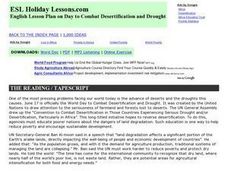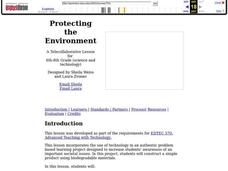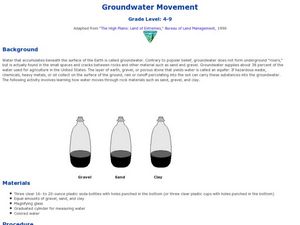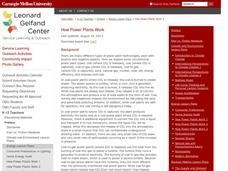CFR Washington
Urbanization and Wildlife
Urbanization and how it affects wildlife is the focus of a presentation that uses statistics to make a case for concern and change.
Florida Department of Environmental Protection
Water's Journey Expedition
Step into a scientist's shoes to go online and discover the Florida Springs Expedition, and participate in two activities focusing on how humans impact the environment. The first activity asks scholars to summarize the six dispatches at...
Chicago Botanic Garden
Greenhouse Gas Emissions — Natural and Human Causes
What impact do humans have on greenhouse gas emissions? What are the natural causes of these gasses? Thanks to the carbon cycle, carbon dioxide eats away at the earth's atmosphere with the intensified help of humans. Young scientists...
Chicago Botanic Garden
Are You Bigfoot?
Scholars independently explore several websites to calculate their ecological footprint. Using their new found knowledge, they answer six short-answer questions and take part in a grand conversation with their peers about how our...
Chicago Botanic Garden
Greenhouse Gas Emissions – Natural and Human Causes
Part three in the series of seven has pupils discussing the different greenhouses gases, learning about the carbon cycle, and then watching a short video about the carbon cycle. Based on their knowledge, individuals complete a greenhouse...
Chicago Botanic Garden
Personal Choices and the Planet
The last activity in the series of four has individuals determine steps they can take to reduce their carbon footprints and then analyze their schools' recycling programs. Through a sustainability audit, they identify how and where their...
Chicago Botanic Garden
Calculating Your Carbon Footprint
Unplugging from technology for one day per week will decrease your carbon footprint—are you up to the challenge? Part two in a series of three allows individuals to explore their personal carbon footprints. By first taking a quiz at home...
Chicago Botanic Garden
Personal Choices and the Planet
How big is your footprint? Activity three culminates the series by having groups complete carbon footprint audits with people in their schools and/or around the districts. Groups then gather their data, create a presentation including...
Chicago Botanic Garden
Calculating Your Ecological Footprint
You can lower your ecological footprint by recycling! Lesson four in this series of five has individuals, through the use of a computer, calculate their ecological footprints. Through discussions and analysis they determine how many...
DiscoverE
Touch Down
Protect the marshmallows! Groups create contraptions that will keep marshmallows in a cup, even after dropping them from a certain height. This is a fun way to model the shock-absorbing capabilities of spacecraft.
California Academy of Science
Sustainable Food Solutions: Weighing the Pros and Cons
A growing demand for sustainable food systems comes from schools and even some cities. So what are some solutions? Scholars consider four different ways to approach sustainable food solutions and list the pros and cons of each. The fifth...
Curated OER
Day to Combat Desertification and Drought
In this day to combat desertification and drought activity, students read or listen to a passage, then match phrases, fill in the blanks, choose the correct words, unscramble words and sentences, write discussion questions and conduct a...
Curated OER
The Pronunciation of Regular Verbs in the Past Exercise
Give your class experience with pronunciation. This worksheet has learners place the given verbs ending in /-ed/ into columns based on the final sound, then state the rules for pronunciation. This is a more advanced activity and is very...
Curated OER
Protecting the Environment
Middle schoolers explain what biodegradable materials are and list examples of them. They design, with online partners' feedback and input, a product made of biodegradable materials and develop a marketing campaign to best sell their...
Curated OER
Composting
Using 2-liter bottles, junior ecologists create composting tubes in which they place nitrogen-rich and carbon-rich materials. They observe what changes occur over two weeks' time. Provide more specific direction to your class as to what...
National Renewable Energy Laboratory
Biomass: Biogas Generator
It's a gas. Middle schoolers build a biogas generator following the directions in this resource. After a few days of observation, they demonstrate that the gas given off by the decomposing manure is flammable. The activity concludes as...
Curated OER
Soil Runoff Challenge
Learners find ways to decrease soil runoff for an African Village as a part of a Peace Corps project. In this soil runoff activity, students play a soil runoff challenge online. Learners complete online activities and view a slide show...
Curated OER
Groundwater Movement
Students study groundwater movement beneath the surface of the Earth. In this agriculture lesson, students experiment with how water moves through rock materials such as sand, gravel, and clay.
Curated OER
Cutting Down Trees
Students research what kind of problems force a city or town to decide to remove trees. Students research what controversy has occurred in other cities or towns. Students interview those responsible for such decisions in your city or...
California Academy of Science
Where Do I Put My Trash?
Where does the trash go after you put it in the garbage can? The class discusses sustainability, recycling, compost, and landfills as they play as fun relay game. In teams, they race to be the fastest group to successfully sort their...
Carnegie Mellon University
How Power Plants Work 1
First of three lessons, this is a great start to a unit on energy. As you demonstrate, learners discover different types of energy and how it is converted from one form to another. They then focus in on the generation of electricity by...
Carnegie Mellon University
How Power Plants Work 2
In this second of three lessons on power plants, future engineers find out how we generate electricity and how coal-powered plants operate. They work in small groups to make electromagnet generators to light LED bulbs. A set of...
Carnegie Mellon University
How Power Plants Work 3
Double, double toil and trouble, fire burn and cauldron bubble! Find out what drives a turbine to generate electricity and whether or not it has an impact on the environment. A discussion and lecture is divided by a hands-on activity in...
Curated OER
What Is a Watershed?
Students explore the concept of water pollution. In this environmental stewardship lesson, students discover what watersheds are and consider how to protect them.

























